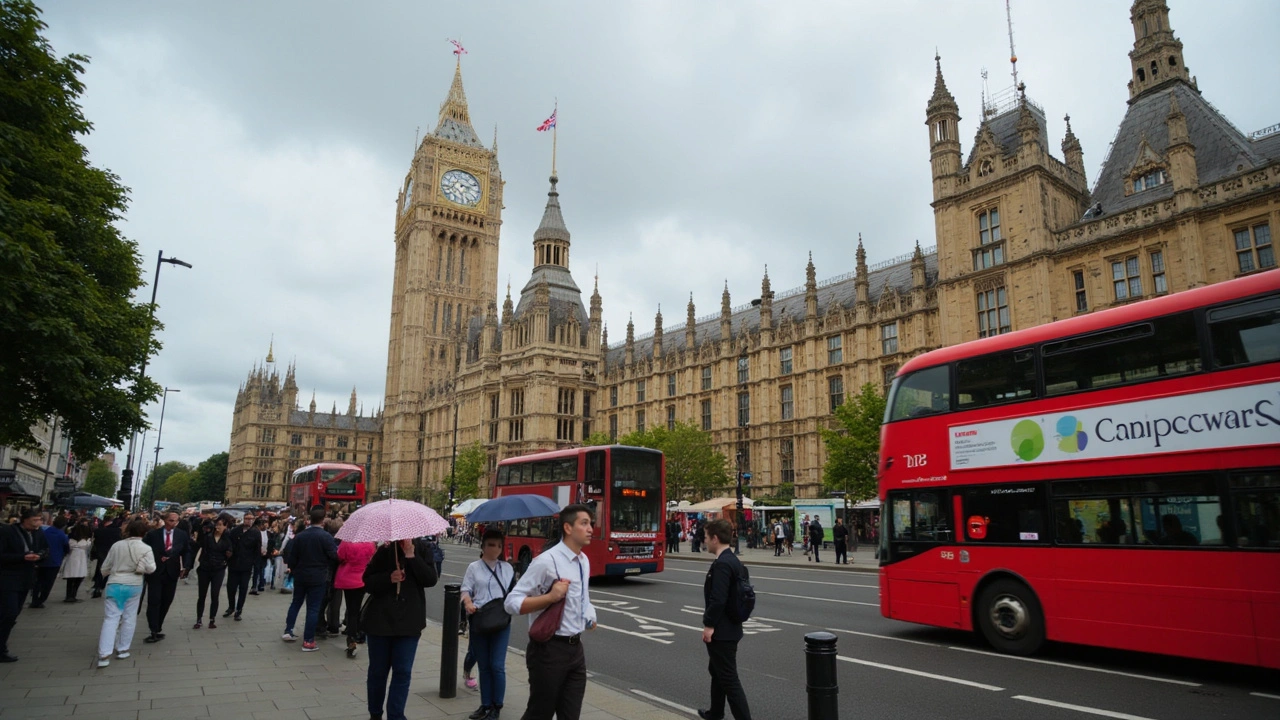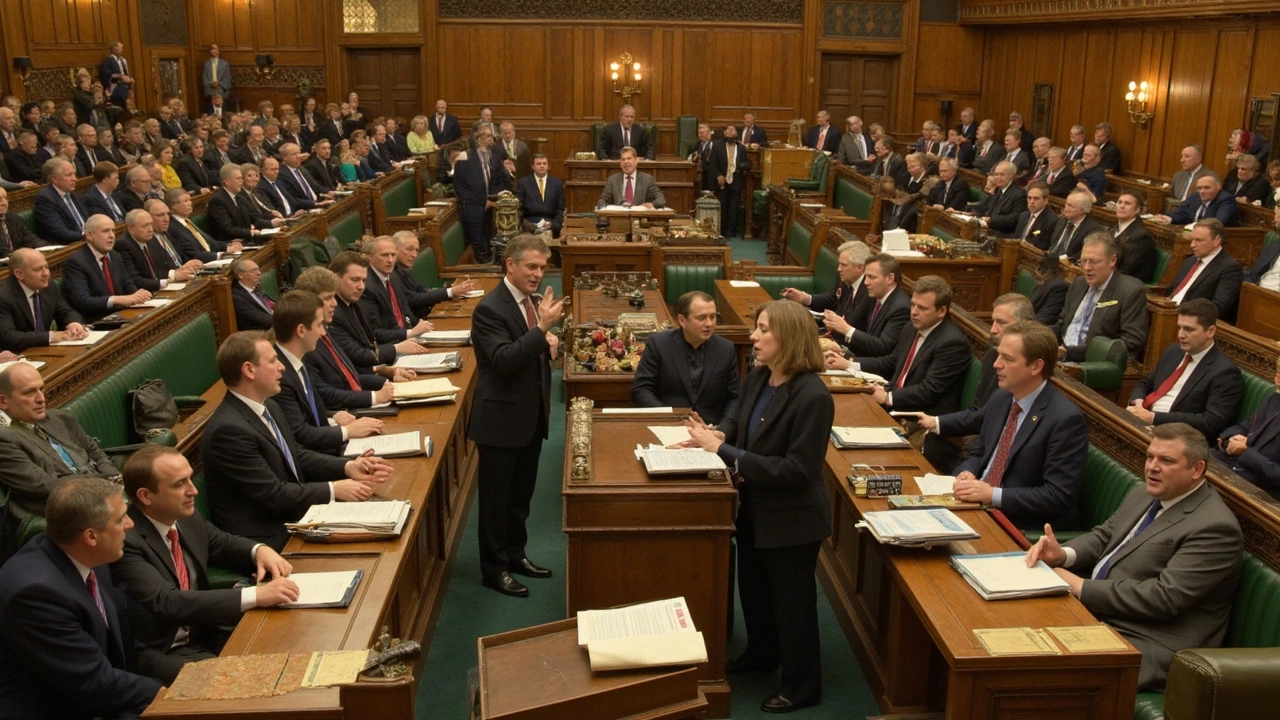
On a rainy Tuesday in London, while black cabs zip past Big Ben and crowds dodge puddles across Westminster Bridge, the true drama unfolds inside the Houses of Parliament. Visitors snap selfies outside the Palace of Westminster, but very few realise just how much the rhythm of local London life beats to the debates and decisions happening downstairs—right in the House of Commons. For anyone living in, working in, or just fascinated by the culture clash and cosmopolitan buzz of London, the House of Commons is not just a tourist spot with pretty gothic facades. It's one of the most powerful engines fuelling the city’s social changes, quirky traditions, and even sudden tube strikes that can reroute an entire commute.
The House of Commons sits in the heart of the Palace of Westminster, hugging the Thames between Westminster Abbey and the London Eye. Its chamber is where 650 Members of Parliament (MPs) trade witty barbs, craft laws, and (sometimes reluctantly) agree how money gets spent on everything from NHS clinics in Lambeth to cycle lanes in Hackney. While plenty of people see the Commons as a symbol—or perhaps just a good reason for traffic jams during protest marches—its roots reach deep into the everyday of Londoners. For centuries, this place has shaped more than just law. From those legendary debates over Churchill’s speeches during the Blitz to the heated back-and-forth about the Congestion Charge (which, honestly, affects anyone who dares attempt to drive through Central), the Commons shapes the city’s pulse.
The House of Commons isn’t as grand as the Lords upstairs—but if you ask most Brits, it’s the room that matters. Here, MPs are elected (often after fiercely fought elections in places like Islington, Camden, or Croydon), while the Lords doze politely or mumble from their seats above, appointed for life. The Commons sets policy that decides everything from the pricing of your morning coffee to which museums get a new roof. There’s a reason why some Londoners queue for hours for public galleries, just to catch a spicy PMQs (Prime Minister’s Questions) session. If you haven’t tried it, it’s worth battling the security line just for the atmosphere when leaders spar and backbenchers heckle like it’s a Friday at the comedy club.
Some traditions here are odd, even by London standards. MPs have to walk through special lobbies to vote (no buttons pushed from their seats!), and you’ll spot the famous green benches that have witnessed brawls, collapses, and joyful cheering. Every law that matters in London—whether it's about e-scooters cluttering pavements in Shoreditch or the latest push to regulate short lets in South Kensington—gets its start or finish within these green walls. Yes, the Commons is old-fashioned, but it manages to reinvent itself just about every session.
People in London aren’t shy about politics—just eavesdrop on any flat-share dinner or chat in a Borough Market food queue. Most of that gets its spark from Commons drama. Here’s what really happens inside: MPs gather (usually noisy, sometimes late), with ministers facing a barrage of questions and Opposition ranks pressing them hard, especially when the Prime Minister is on the ropes. The Speaker, currently a major figure in British telly by accident, tries and sometimes fails to keep order while MPs squeeze into benches designed for perhaps two-thirds of them (the chamber is so snug because it was built before they started stacking extra seats for every new constituency).
Bills are introduced, debated, then chopped apart in committee rooms above the Thames—Parliament has no shortage of stories about last-minute amendments that quietly change lives in Ealing or Enfield. For Londoners, these Bills can mean new council powers, extra funds for TFL, or rules about nighttime licensing in Soho. The magic? Anyone can watch. You can actually wander into Westminster, after a quick security scan, and see how the sausage is made—or, at least, how someone tries to grill the Prime Minister over NHS waiting times on a Wednesday at noon.
The real action happens during votes, called "divisions". Red and green signs pop up, the bells ring all over Parliament (and even in some MP bars nearby), and politicians dash through one door or the other. If you’re outside, you’ll sometimes hear the cheers through the street-side windows, especially during tight votes on issues like rent control or new policing powers. Deadlines are fierce—if you’re an MP for Hackney South and running late, you’ll get no second chance; missing the vote can haunt you during the next Twitter storm or local hustings at the community hall.
Debates are notorious for their London flair—MPs use references everyone from a cabbie in Clapham to a tech start-up whizz in Shoreditch would know. There are jokes about Northern Line delays, gripes about late night kebab shops, and even the occasional dig at Arsenal’s defence. The Commons isn’t just suits and stuffy tradition—it reflects the everyday theatre of London’s high streets, from Edgware to Dulwich. If you’re wondering, "Can I see it all in person?"—absolutely. Book a tour (they do some in the evenings, which feels a bit magical as daylight fades across the river) or fight for a seat during public debates. Don’t bring a selfie stick, though—it’s not allowed.

Wander around Westminster at lunchtime and you might bump into MPs hurrying back from a Pret run (yes, they’re just as addicted to flat whites as anyone else). But tradition here is not just lunchtime sandwiches or early starts. The Commons holds on to centuries-old quirks: the ceremonial mace, Black Rod hammering on the door for the State Opening, and that rule that swords are technically not allowed—though no one’s checked for a while. Sadly, the chamber itself isn’t as roomy as the nearby Sky Garden or as plush as the Shard’s bars, but it’s probably hosted more plot twists than EastEnders ever has.
Each MP represents a patch of the country, and London’s cluster is particularly impactful. Boroughs like Westminster, Hackney, and Tower Hamlets each get their own champion, fighting for local schools or defending neighbourhood green space. In practice, this means petitions, urgent questions, and sometimes all-night debates when London feels a threat to its vibrant culture—think back to rows about music venue closures in Camden or fireworks by the Thames.
But the Commons is also where big city shifts start. The congestion charge? Born from Commons chatter and endless late-night arguments. Oyster cards, green taxis, and even legal protection for renters—each one traced back to a moment when a tired Minister gave in or an energetic backbencher (often with a London accent) refused to drop an issue. This constant cycle of debate and tradition makes the Commons both predictable and full of surprises, nudging London’s future a bit with every session. If you’re curious about what’s coming next—whether it's laws on scooter rentals, council tax bands, or free childcare schemes—odds are, it’ll be thrashed out beneath the Commons’ green lights long before you see it in headlines.
If you love your stats, here’s a look at how much of Parliament’s activity actually circles back to issues affecting London:
| Year | London-focused Debates | Bills Impacting London | London MPs Involved |
|---|---|---|---|
| 2022 | 92 | 14 | 73 |
| 2023 | 108 | 17 | 74 |
| 2024 | 126 | 20 | 75 |
This surge is partly because London’s population keeps climbing—and the city never sleeps. MPs argue over housing developments in Stratford one day, then public health policy for Hounslow hospitals the next. It’s relentless, but that’s what makes the Commons so key to Londoners. Ever noticed how Friday night tube delays get more media coverage than rural train complaints? You can thank both the Commons debate schedule—and a lot of London MPs fighting their corner.
Let’s get practical. If you’ve never seen a Commons debate in person, stick it on your London bucket list—right between Columbia Road flower market and a picnic on Hampstead Heath. It’s free (score), open almost every week the House is sitting, and even native Londoners come away surprised by how close you feel to the big decisions (and sometimes, the drama). Wednesdays at noon are best for spectacle, especially PMQs—arrive by 10 for a shot at the public gallery, but bring ID and expect airport-style security. Don’t try to smuggle in snacks, and keep your phone on silent, or a Sergeant-at-Arms will have word.
If you want to see the bones of how it’s run, book a guided tour—they sell out quickly, especially on weekends. Or, during special open days, locals get the rare chance to walk not only through the Commons chamber, but into committee rooms and even the private Members’ Lobby, where MPs hammer out last-minute deals. Look out for “Parliament in the Park” events in summer, where MPs discuss big local issues outdoors (rather fun in the sun, and you can grill your MP face-to-face).
For Londoners, connecting with your MP is actually easy. Most hold regular surgeries at local libraries, town halls, or even, famously, at a Costa. Need an issue raised? Write, email, or just show up—MPs know angry letters from a handful of passionate Chiswick or Lewisham voters can snowball online. If politics feels remote, point out how the Congestion Charge, planning regulations for historic boroughs, and even the extension of the Night Tube all trace their roots to Commons lobbying. That bit of control? It’s one of the quirks of living in the capital.
Bit of trivia: London MPs sometimes work together across party lines when it comes to threats to the city’s landmarks, public festivals, or nightlife. In debates about Notting Hill Carnival, Wimbledon, or NYE fireworks, there’s sudden unity—possibly the only time you’ll see rival MPs from Brent and Bromley on the same side. Want to follow the latest? Go beyond just BBC Parliament—many MPs livestream updates or share sneaky behind-the-scenes shots on Instagram. You’ll find the real personalities in the casual posts, from selfies on Portcullis House terrace to shots of all-nighters during budget rows.
Next time you stroll past that big gold-tipped clocktower, remember: inside, London power struggles play out every day. The House of Commons isn’t just part of London’s skyline, it’s a living, bickering, caffeine-fuelled body driving city life. And if someone at the bar starts grumbling about the new council taxes or the price of your craft ale, odds are, it all started in those green benches just over the Thames.